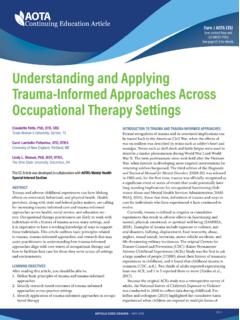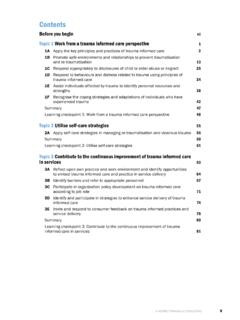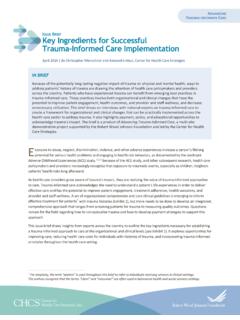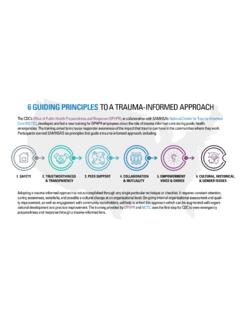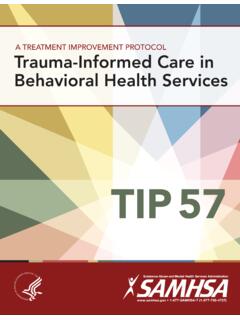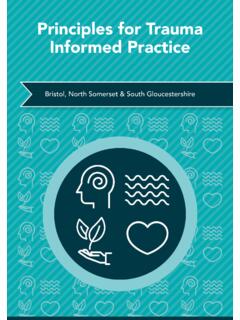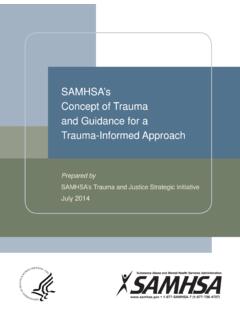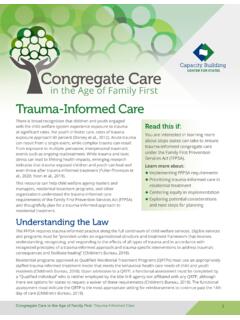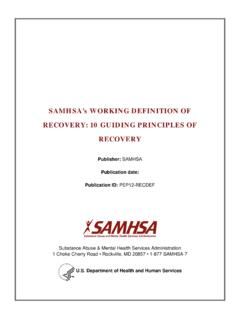Transcription of Trauma Informed Care Powerpoint - Primary Care Version
1 Trauma Informed Care in Primary Care Settings Developed by the Trauma Committee at The Institute for Family Health The Trauma Committee at IFH. | A committee of patients, interns and staff dedicated to helping IFH provide Trauma Informed care, across all sites and all positions | We need nursing, medical and administrative members for our committee! Please talk to Rebecca if interested. | Please email or call Rebecca Green with any Trauma related questions or referrals :718-293- 3900 ext 1839 Training Goals | What is Trauma ? | HowDoes Trauma Negatively Impact Health? | Whatis Trauma Informed Care in Primary Care?
2 | HowCan I Provide Trauma Informed Care? What is Trauma ? | Trauma occurs when a person experiences a serious injury, threat of death and/or violation of personal integrity OR witnesses a serious injury, threat of death or actual death AND the experience evokes strong feelings of fear, helplessness or horror. | Extreme stress that overwhelms a person's ability to cope. Source: American Psychiatric Association. (2000). Diagnostic and statistical manual of mental disorders (4th ed., text rev.). Washington, DC: Author. What is Trauma ? | Examples of Traumatic Experiences: War and other forms of Cultural, violence intergenerational and historic Trauma Childhood abuse or Medical interventions neglect Physical, emotional or Sudden or violent loss of sexual abuse a loved one Accidents and natural School Shootings disasters Witnessing violence What is Trauma ?
3 | Individuals experience events differently; an event is traumatic depending on how an individual interprets, applies meaning to, and is disrupted by that event. | Bottom Line: If a person feels traumatized by an event or experience, than that event was traumatic. What Do We Know About Trauma ? | Trauma is common. Between 55 and 90% of us have experienced at least one traumatic event, and on average nearly five traumatic events. | The impact of Trauma is very broad and touches many life areas. Trauma can impact a person across many parts of life: medical, mental health, family, job, etc.
4 | The impact of Trauma is often deep and life-shaping. Trauma can be fundamentally life-altering, especially for those individuals who have faced repeated and prolonged abuse and especially when the violence is perpetrated by those who were supposed to be caretakers. Physical, sexual, and emotional violence become central realities, and people adapt around them. What Do We Know About Trauma ? | Trauma affects the way people approach potentially helpful relationships. Not surprisingly, those individuals with histories of abuse are often reluctant to engage in, or quickly drop out of, many human services.
5 | Trauma has often occurred in the service context itself. Involuntary and physically coercive practices, as well as other activities that trigger Trauma -related reactions, are still too common in our centers of help and care. How Common is Trauma ? | 70% of adults in the have experienced some type of traumatic event at least once in their lives (National Council for Community Behavioral Healthcare). | Over 90% of patients who are seen in public behavioral health clinics (like IFH mental health clinics) have experienced Trauma (National Council for Community Behavioral Healthcare). | Trauma can result in a wide range of responses including intense feelings of fear, loss of trust in others, decreased sense of personal safety, guilt, and shame.
6 The Adverse Childhood Experiences (ACE) Study | Kaiser Permanente study of 17,000 members, started in 1995-1997, looking at childhood Trauma and health outcomes | 10 question screening tool: During your first 18 years of life . y Did a parent or other adult in the household often swear at you, insult you, put you down or humiliate you? Or act in a way that made you afraid that you might be physically hurt? y Did a parent or other adult in the household often push, grab, slap or throw something at you? Or ever hit you so hard that you had marks or were injured? y Did you live with anyone who was a problem drinker or alcoholic or who used street drugs y Was a household member depressed or mentally ill or did a household member attempt suicide?
7 Y Did a household member go to prison? The Adverse Childhood Experiences (ACE) Study | Outcomes: y Childhood Trauma was very common, even in employed white middle-class, college-educated people with great health insurance y There was a direct link between childhood Trauma and adult onset of chronic disease, as well as depression, suicide, being violent and a victim of violence y More types of Trauma increased the risk of health, social and emotional problems y People usually experience more than one type of Trauma rarely is it only sex abuse or only verbal abuse Source: The Adverse Childhood Experiences (ACE) Study How Does Trauma Negatively Impact Health?
8 | Trauma has been linked to many negative health outcomes, even after controlling for behaviors such as smoking, substance use and unprotected sex Chronic obstructive Sexually transmitted pulmonary disease (COPD) diseases (STDs). Ischemic heart disease (IHD) Suicide attempts Liver disease Lung Disease Fetal death Substance Use How Does Trauma Negatively Impact Health? Adverse Childhood Experiences Increase in negative Disrupted neuro- coping behaviors as development, leading to attempt to self-medicate physical deregulation Negative Health Outcomes How Does Trauma Negatively Impact Health?
9 | A person with an ACE score of 7, with no evidence of risk taking behaviors, has a 30-70% increased risk of developing ischemic heart disease as an adult | A person with an ACE score of 4 or higher is 2-4x more likely to develop anger problems or depression than someone with a lower score, as well as 2-4x more likely to develop hypertension and diabetes | As the number of ACE experiences increased, so did the chances of the individual experiencing cancer, chronic lung disease, skeletal fractures and liver disease How Does Trauma Negatively Impact Health? | Experiencing Trauma causes neurochemical changes in the brain, that have biological (as well as psychological and behavioral) effects on a person's health y Changes in the hypothalamic-pituitary adrenal (HPA).
10 Axis, a part of the brain that controls reactions to stress and regulates many body processes, including the immune system y Increased allostatic load cumulative cost of experiencing lots of stress which leads to an increased susceptibility to illness Source: Norman, S. B., Means-Christensen, A. J., Craske, M. G., Sherbourne, C. D., Roy-Byrne, P. P. and Stein, M. B. (2006), Associations between psychological Trauma and physical illness in Primary care. J. Traum. Stress, 19: 461 470. doi: Trauma in Primary Care Settings | This may be a person who's gone through something very traumatic [who needs] some really safe technique Because otherwise you're going to have a certain segment of patients that are going to walk away feeling as though they've been abused all over again, quietly abused, just walking away and seeking another health practitioner, just going through the cycle, again and again and again, and maybe not understanding why, maybe not knowing how to say it, how to voice that, just keep going through that whole cycle over and over again.
